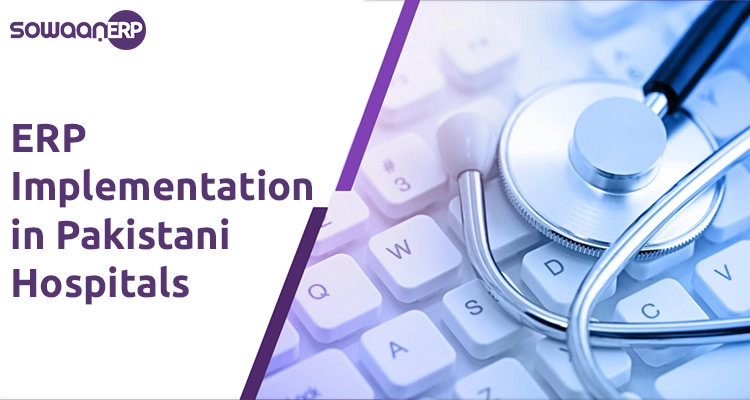
The vitality of business processes is undeniable in the current digital era. Specifically, for Pakistani hospitals, the implementation of ERP software for businesses in Pakistan can be a significant step forward. This move can boost efficiency and elevate patient care services.
Indeed, with the increasing complexity of hospital operations, there is a growing need for systems that streamline workflows and improve data management. ERP software, designed to integrate various business processes into a single system, can be an effective solution for Pakistani hospitals. By harnessing the power of ERP, these healthcare facilities can not only optimize their administrative tasks but also enhance patient experience, thereby setting new standards in the healthcare sector.
A glimpse into ERP software
ERP, standing for Enterprise Resource Planning software, is a comprehensive system that integrates and manages all facets of a business. In the context of hospitals, adopting top ERP system in Pakistan can assist in managing diverse areas such as patient records, inventory, billing, and much more.
In addition, ERP software can enable effective decision-making through real-time data. It also supports regulatory compliance by maintaining accurate records. Importantly, it provides a unified platform for all departments, enhancing collaboration. Lastly, it can significantly reduce operational costs, contributing to the hospital’s financial health.
Why does ERP matter in Pakistani hospitals?
Hospitals are intricate entities with numerous interlinked components. An effective ERP system can synchronize these components, facilitating smoother operations. The adoption of a top ERP software solutions in Pakistan can bring about a notable difference in the functioning of hospitals. It can result in improved patient care, minimized wait times, and a more efficient utilization of resources.
Furthermore, the ERP system can streamline administrative tasks, allowing medical staff to focus more on patient care. It also enhances data accessibility and accuracy, leading to better decision-making. The system can also boost financial management through improved billing and cost tracking. Lastly, it fosters better communication and collaboration among departments, promoting a more cohesive healthcare delivery system.
Selecting the appropriate ERP solution
When it comes to selecting the right ERP solution, hospitals need to ponder upon several aspects. These include the specific needs of the hospital, the user-friendliness of the software, and its compatibility with the hospital’s existing systems. Corporate ERP solutions in Pakistan offer a myriad of features that can be tailored to suit each hospital’s unique needs.
Moreover, the selection process should take into account the scalability of the software, ensuring it can grow with the hospital’s needs. Support and training offered by the ERP vendor are also key considerations. The cost-effectiveness of the solution, including the initial investment and ongoing maintenance costs, is another important factor. Lastly, hospitals should consider the reputation and reliability of the ERP vendor, as well as the software’s ability to integrate with future technological advancements.
Step-by-step guide to implementing ERP in hospitals
- Identify Your Needs: Begin by pinpointing the specific needs and objectives of your hospital. Ask questions like, what are the key pain points? What processes need optimizing? This could involve consulting various stakeholders, including medical staff, administration, and IT personnel, to gain a comprehensive understanding of the current system’s shortcomings and areas for improvement.
- Choose the Right ERP System: After defining your needs, it’s time to select an ERP system that aligns with those requirements. Consider ERP solutions that offer customization options to cater to your hospital’s unique needs. Evaluate multiple ERP vendors, taking into account their reputation, customer service, and the scalability of their systems.
- Plan for Implementation: With the appropriate ERP system selected, initiate the planning phase for its implementation. This includes setting realistic timelines, delegating tasks to responsible teams, and anticipating potential obstacles. Also, ensure you have a contingency plan in place to address any unexpected challenges during the implementation process.
- Train Your Staff: Prior to launching the system, invest time in comprehensive training programs for your staff. This not only involves teaching them how to use the new system but also explaining the benefits and potential changes in their daily workflows. Regular sessions and refresher courses can help ensure everyone is comfortable with the new system.
- Go Live and Evaluate: Once the system is live, maintain vigilant monitoring to swiftly identify and rectify any issues. Regular evaluations of the system’s performance against predefined objectives can help ascertain if it’s delivering the expected benefits. Also, be open to feedback from users as it can provide valuable insights for further improvement.
The perks of ERP implementation
The implementation of ERP software can bring countless benefits to Pakistani hospitals. It can streamline business processes, leading to heightened efficiency and productivity. Moreover, ERP software for Pakistani enterprises can provide real-time data, facilitating prompt decision-making and enhanced patient care.
Additionally, ERP systems can automate mundane tasks, freeing up staff to focus on more critical areas. This automation also reduces the risk of human error, thereby improving accuracy. The software can enhance data security, a crucial aspect in healthcare where patient confidentiality is paramount. Furthermore, ERP provides scalability, supporting growth and expansion. Lastly, it simplifies risk management through consolidated data and advanced analytics.
Conclusion
In wrapping up, optimizing business processes through the implementation of ERP software in Pakistani hospitals can lead to considerable enhancements. It’s an investment that can yield significant returns in terms of efficiency, productivity, and patient satisfaction. With thorough planning, implementation, and training, ERP software can indeed be a turning point for Pakistani hospitals.
Indeed, the adoption of corporate ERP solutions in Pakistan can revolutionize healthcare delivery, providing a platform for integrated, patient-centric care. It brings together disparate systems, creating a unified view that helps in better decision-making. The ability to customize ERP solutions allows hospitals to adopt a system that aligns with their unique needs and objectives. As technology continues to advance, hospitals that embrace such digital transformations can stay ahead of the curve, offering superior patient care. In essence, ERP software holds the potential to become the backbone of efficient and effective hospital management in Pakistan.


